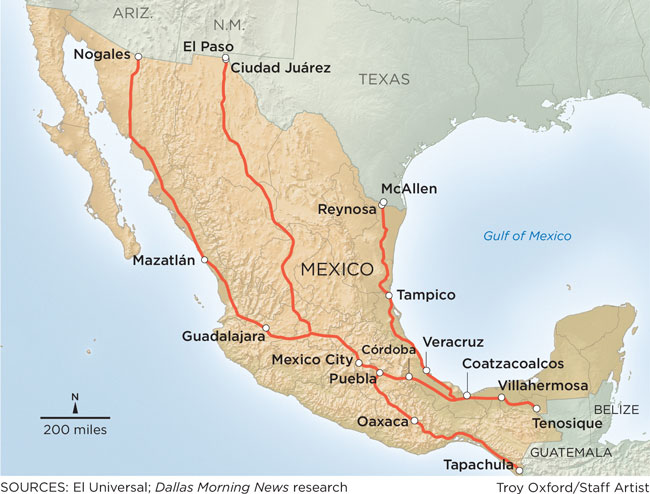A migrant’s journey from Honduras to Sonoma County
May 1, 2022
Julia* started her journey from Honduras at age 19. The United States to her looked like a dreamland, the same way as it does to millions of immigrants. Her life in Honduras was poor. Her family struggled, and Julia could see no future.
Many people in Julia’s village also thought of America as the promised land. But the journey would not come cheap; many in fact risk their entire life savings to come and make this trip.
“My mom spent about $11,000 to (help me) cross,” she said. The $11,000 paid for a coyote to lead Julia from Honduras to America.
The journey from Honduras also came with physical risks, a test of endurance. She walked from her village across Honduras with 25 others.
On foot, they slowly made their way through Guatemala and into Mexico.
“We would walk from 5 a.m. until 5 p.m., and some days until 7 p.m.,” Julia said. “We would sleep on the [desert] floor there, in between the snakes.”
Food and water were scarce. At times Julia and the others had to drink water from puddles, farm wells, or whatever source they could find. Food was a luxury to the travelers. Sometimes the coyote supplied only one egg to her for the entire day. Eleven of the 25 people dropped out from exhaustion.
Most horrific, however, was what she saw along the route.“I saw three dead bodies, two that were still decaying, and one with just the bones left,” she said.
Julia and the 13 remaining migrants crossed a river at night into Texas. “It took a month and three days,” Julia said of the journey.
The group made their way into Houston, where they packed into a van and traveled to California.
Julia considers herself one of the lucky ones to actually make it to Sonoma County, where she had family.
Julia’s Journey
Migrants work for lower wages, endure hardships
America was founded by immigrants; they have always played an important role in American society. But the political climate today scapegoats Mexican and Central American immigrants as people who take Americans’ jobs, commit crimes and drain our social systems. Immigrants take the treacherous journey to try and make ends meet, and also supply one of the biggest labor forces in the country. Many do not realize how hard the actual journey is to come to America.
The Journey to America is indescribably difficult, but it’s one thousands are willing to take to have a chance at a better life.
Immigrants work very hard, yet they earn less money for their efforts than U.S.-born workers. The minimum wage for an American born in California is around or over $25 an hour, but for an immigrant toiling under the hot sun, the payment is under $25, sometimes under $20.
“Twenty-five dollars an hour is a minimum wage in Sonoma County, but then when you’re talking about people of color, and women, ya know, people, there’s a feeling like these people deserve to make less than everybody else for some reason,” said Graton day labor worker Christy Lubin.
Depending on an immigrant’s status, the pay is different, but still below a U.S.-born worker’s pay. An undocumented immigrant is paid around $13, while a Lawful Permanent Resident Immigrant is paid around $18, and a naturalized immigrant is close to $25.
Some immigrants not only suffer from being underpaid, but also not paid at all. Lubin estimates that wage theft amounts to more than $50 million in California alone from immigrants and people of color.
“There’s a big issue of wage disparity, so here we’re getting just wages and safe working conditions.”
The struggles immigrants go through can be very challenging at times, and many can feel like they are alone.The Graton Day Labor Center, helps Sonoma County immigrants it is a safe space, where they can find jobs, protest working conditions, and get help with all the legal trouble or immigration status.
“We helped win the domestic worker bill of rights; now domestic workers get overtime in California,” Lupin said. It is one of many accomplishments. Along with fighting for workers rights, they help immigrants find good-paying jobs.
“We’re trying to improve the working and living conditions for the undocumented worker community, not just the people who come here to the center, but throughout the county,” Lupin said.
Settling down in America is a difficult transition for many. And maybe some can call it part two of their journey. Learning an entire new culture, language, and way of living was rough for Julia. In the year Julia’s been here, she still has trouble with English.
And she misses her family in Honduras, a family she doesn’t know if she’ll see again. “It is very difficult to leave all your family and everything you’ve known behind,” Julia said. “Especially when you’re this far [away.]”
Most people who make the journey have a goal to help those they left behind back home. And a return back to their native country is a dream most have.
“I have the faith that one day I will return to Honduras,” Julia said. She, like many others, hopes to make their“ American dreams” come true, and then return to her village and enjoy her prosperity with them.
*Julia’s name was changed to protect her identity.
